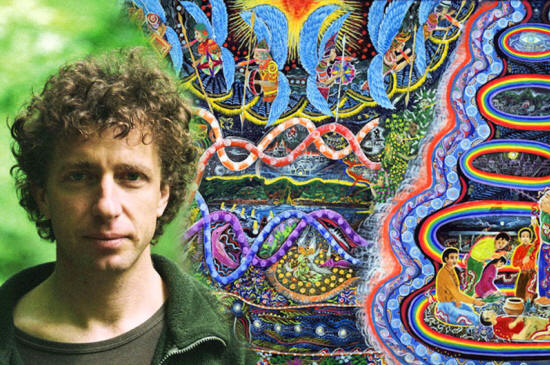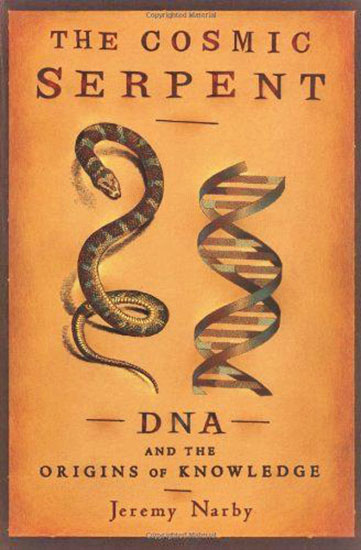|

by Dylan Charles
June 16, 2017
from
WakingTimes Website
Spanish version
|
Dylan Charles is a student
and teacher of Shaolin Kung Fu, Tai Chi and Qi Gong, a
practitioner of Yoga and Taoist arts, and an activist
and idealist passionately engaged in the struggle for a
more sustainable and just world
for future generations.
He is the editor of WakingTimes.com,
the proprietor of OffgridOutpost.com,
a grateful father and a man who seeks to enlighten
others with the power of inspiring information and
action.
He may be contacted at wakingtimes@gmail.com. |

The shaman's world is one of allegory, symbolism, metaphor and
transcendence into the realms of energy and spirit.
Their understanding of
the universe and the abundant sentient beings which inhabit it is
wildly foreign to the mind of the material scientist.
Our best chance,
therefore, at bridging the gap between science and spirit may lie in
the anthropological study of those tribal cultures whose operating
systems permit them to move freely in the metaphysical realms with
the assistance of natural hallucinogenic substances.
The shamanic explanation of the origins of life and of the
intelligent nature of the plants and animals which inhabit the
rainforest are quite unbelievable to most, but a rational approach
to understanding their perspective lends extraordinary insight into
some of the greatest mysteries of human consciousness.
Author and anthropologist Jeremy Narby set out in the mid
1980's to do just this, hoping to learn from medicine men of the
Amazon jungle about how it is they claim to be able to communicate
directly with plants and unseen spirit beings of the forest.
In his remarkable
must-read book,
The Cosmic Serpent - DNA and the Origins of
Knowledge, his journey of empirical study takes a
remarkable twist when he agrees to ingest the potent shamanic plant
medicine:
Ayahuasca.
Briefly summing up
his book in an interview with
Deoxy's
Todd Stewart, Narby
remarks:
"Research
indicates that shamans access an intelligence, which they say is
nature's, and which gives them information that has stunning
correspondences with molecular biology."
Researching this
hypothesis, Narby began by examining the very real paradox offered
by plant masters of the Amazon, namely that their vast, extensive,
and incredibly thorough understanding of the thousands of plants in
their environment is the result, not of any kind of scientific study
as we know in the West, but rather as the result of direct
communication with plants themselves.
"So here are
people without electron microscopes who choose, among some
80.000 Amazonian plant species, the leaves of a bush containing
a hallucinogenic brain hormone, which they combine with a vine
containing substances that inactivate an enzyme of the digestive
tract, which would otherwise block the hallucinogenic effect.
And they do
this to modify their consciousness.
It is as if
they knew about the molecular properties of plants and the art
of combining them, and when one asks them how they know these
things, they say their knowledge comes directly from
hallucinogenic plants."
Jeremy Narby
At face value, the
claim may seem ridiculous to the western mind, yet the fact remains
that shamanic knowledge, especially regarding the medicinal
properties of thousands of plants, is so thorough that it has
provided the basis for the modern pharmacological model of medical
science.
Many of the
top-selling and most effective medicines of our age were derived
directly from the culturally appropriated knowledge of the people of
the rainforest.
Intrigued by this
perspective, Narby ultimately agreed to participate in Ayahuasca
ceremonies to experience first-hand the connection spoken of by
scores of indigenous cultures and medicine traditions.
Doing so led him to
the conclusion that not only were these people being truthful in
their assertion of direct
communication with plants is possible, but
that their hallucinogenic journeys may provide a means of unlocking
and accessing the origins of human knowledge which have been
transmitted for eons in the codes within DNA.
"Intelligence
comes from the Latin inter-legere, to choose between.
There seems to
be a capacity to make choices operating inside each cell in our
body, down to the level of individual proteins and enzymes.
DNA itself is a kind of "text"
that functions through a coding system called "genetic code,"
which is strikingly similar to codes used by human beings. "
Jeremy Narby

The Cosmic Serpent
by
Jeremy Narby.
During an intense
period of analysis into the content of his plant medicine visions,
testimony from the shamans he worked with, and his scholarly study
of DNA, Narby had the realization that many ancient cave art
paintings and shamanic artwork of bygone civilizations seems to
produce similar iconic images of intertwining snakes, which look
remarkably like the double-helix form of DNA.
DNA and the Cosmic Serpent
Is this mere
coincidence, or have ancient cultures across the globe been directly
accessing DNA with the assistance of consciousness altering natural
substances found in abundance on planet earth?
Narby explains
further:
"DNA is a
single molecule with a double helix structure; it is two
complementary versions of the same "text" wrapped around each
other; this allows it to unwind and make copies of itself:
twins!
This twinning
mechanism is at the heart of life since it began. Without it,
one cell could not become two, and life would not exist. And,
from one generation to the next, the DNA text can also be
modified, so it allows both constancy and transformation.
This means that
beings can be the same and not the same. One of the mysteries is
what drives the changes in the DNA text in evolution.
DNA has
apparently been around for billions of years in its current form
in virtually all forms of life. The old theory - random
accumulation of errors combined with natural selection - does
not fully explain the data currently generated by genome
sequencing.
The question is
wide open."
Jeremy Narby
The imagery of the
snaking figures led Narby to the defining concept of the Cosmic
Serpent, the potential source of intelligence in our universe, and
the symbolism of the snaking figures in a double helix is central to
his question of whether or not shamans can directly access the codes
of life during altered states of consciousness.
Again, Narby
explains:
"This is the
observation that led me to investigate the cosmic serpent. I
found the symbol in
shamanism all over the world.
Why? That's a
good question.
My hypothesis
is that it is connected to the double helix of DNA inside
virtually all living beings. And DNA itself is a symbolic
Saussurian code. So, yes, in at
least one important way, the living world is inherently
symbolic.
We are made of
living language.
Both shamans
and molecular biologists agree that there is a hidden unity
under the surface of life's diversity; both associate this unity
with the double helix shape (or two entwined serpents, a twisted
ladder, a spiral staircase, two vines wrapped around each
other); both consider that one must deal with this level of
reality in order to heal.
One can fill a
book with correspondences between shamanism and
molecular biology."
Jeremy Narby
While certainly a
fascinating and refreshing take on the important role of shamanism,
language, symbolism and consciousness in human development, Narby
acknowledges that his theory opens the door for entire new set of
questions to be examined by the scientific community.
"I think we
should attend to the words we use. 'Consciousness' carries
different baggage than 'intelligence.'
Many would
define human consciousness as different from, say, animal
consciousness, because humans are conscious of being conscious.
But how do we
know that dolphins don't think about being dolphins?
I do not know
whether there is a 'consciousness' inside our cells; for now,
the question seems out of reach; we have a hard enough time
understanding our own consciousness - though we use it most of
the time. I propose the concept of 'intelligence' to describe
what proteins and cells do, simply because it makes the data
more comprehensible.
This concept
will require at least a decade or two for biologists to consider
and test. Then, we might be able to move along and consider the
idea of a "cellular consciousness."
I wrote the
book because I felt that certain things needed saying. Writing a
book is like sending out a message in a bottle: sometimes one
gets replies. Judging from the responses, a surprising number of
people have got the message loud and clear
Jeremy Narby
Indeed, the
question is wide open for exploration, but the proposition that we
human beings may be able to directly communicate with DNA in order
to influence our own evolution is a powerful one, especially in the
context of technological advancements which give us more options
than ever of collecting and organizing data.
What knowledge have
we human beings forgotten in our press forward in time, and can this
knowledge be recovered and put to good use when determining our
future?
|



